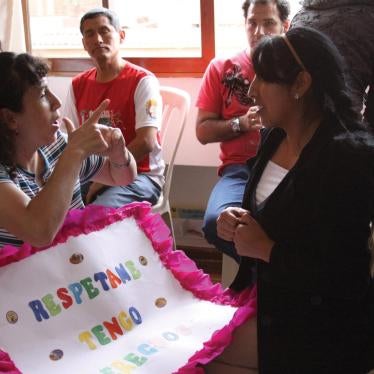(Lima) – Thousands of Peruvians with disabilities risk losing some of their legal rights if Congress passes a new law for people with disabilities that would replace existing legislation, Human Rights Watch said today.
The Commission on Social Inclusion and People with Disabilities in the Peruvian Congress approved the draft bill on February 8, 2021, without engaging in a broad consultation process with groups representing people with disabilities. The Commission’s approval paves the way for the bill to be approved by Congress in the coming weeks. If passed, the bill would replace law 29973, the General Law on Persons with Disabilities, jeopardizing many rights protected in the previous legislation, including the right to consent to mental health treatment.
“By passing this bill, Peru’s Congress would be moving the country backward on disability rights,” said Carlos Ríos Espinosa, senior disability rights researcher at Human Rights Watch. “Congress should pause the bill until it has properly consulted with people with disabilities and amended the problematic provisions.”
In October 2020, Human Rights Watch sent a letter to members of the commission, including its then-president, Mirtha Esther Vásquez Chuquilín. Human Rights Watch expressed concerns about the bill’s substantive content as well as the insufficient consultation process.
Human Rights Watch noted that there had been no public announcement soliciting the input of people with disabilities, as required under the UN Convention on the Rights of Persons with Disabilities (CRPD), which Peru ratified in December 2008. Under article 4.3 of this international treaty, States Parties are obligated to closely consult with people with disabilities through their representative organizations on “the development and implementation of legislation and policies to implement the present Convention, and in other decision-making processes concerning issues relating to persons with disabilities.”
The CRPD Committee, the body charged with authoritative interpretations of the treaty, describes consultation as a “mandatory step prior to the approval of laws, regulations and policies, whether mainstream or disability specific.”
Consultations, the committee said, need to be timely, accessible, and meaningful. The latest version of the draft bill was published on February 5 and then approved only three days later without providing the document in an accessible format for people with disabilities to participate meaningfully. People who are blind could not access the draft because it was provided only in jpeg form. And no easy-to-read language was provided for people with intellectual disabilities. While the commission did address some Human Rights Watch concerns over the bill’s substance in the draft published on February 5, the version the commission ultimately approved included new problematic amendments that would have repercussions for education and mental health.
The new version establishes educational grants to people with disabilities, but it also introduces categories of eligibility that are linked to the severity of the disability. The bill would restrict access to education grants to people who have moderate and severe disabilities and exclude those with so-called mild disabilities.
This distinction is problematic because it opens the door to arbitrary decisions based on medical criteria. Assessments of disability that rely exclusively on medical criteria run afoul of the international convention, which considers disability as a relational concept rooted in the context of social barriers and prevailing social attitudes that cannot be defined on the basis of individual characteristics.
Congress should revise the eligibility criteria for disability grants and consider including a socio-economic analysis but, above all, consult with the disability community on the appropriate selection criteria.
Human Rights Watch is also concerned about the impact of the bill on the right to full legal capacity for people with disabilities to make decisions related to their mental health treatment. Peru’s civil legislation has been internationally recognized as one of the most advanced in terms of the recognition of full legal capacity.
The current legislation, which came into effect in September 2018, requires consent as a prerequisite for any mental health treatment and allows people with disabilities to reject treatment. The new bill would be a step back because it would authorize nonconsensual internment based on medical necessity, disregarding the right to informed consent and the right to supported decision-making if the person decides to ask for it. “The Peruvian Congress should take the rights of people with disabilities seriously,” Ríos Espinosa said. “It should meaningfully consult with disability rights groups and make sure it does not pass provisions that are less protective than the current legislation.”





